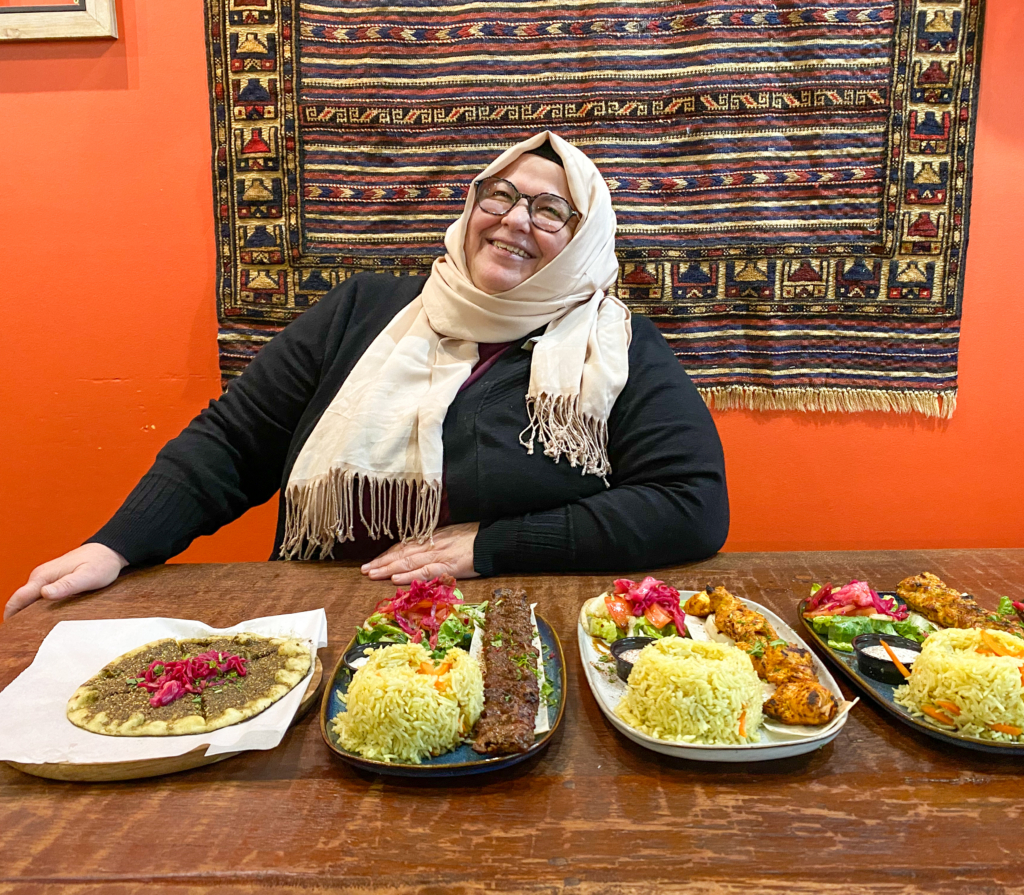
Meet Süreyya Gökeri, owner of Cafe Turko in Fremont.
Learn more about Süreyya and Cafe Turko in this week’s Small Business Spotlight Q&A!
This interview has been edited for length and clarity.
How did Cafe Turko come to be?
Cafe Turko just turned 11 years old, and I have no idea how this time passed so fast.
I remember when I discussed with my husband that he wanted a restaurant, and I wanted to continue my cooking career, cooking classes at PCC. And I told him, you are on your way, I am on my way, we are not going to work together any longer. But you know, you don’t make the plans, God makes the plans for you. So we ended up opening a little cafe with the help of my landlord.
So when I opened the restaurant, we did not have food. It was a cafe. I only had a tiny convection oven, $800, and nothing else. So I started showing my cooking talent and put something extra on the menu every day. But we were baking rice, baking vegetables. We were baking everything because we didn’t have a stove. That poor oven, we couldn’t handle it anymore. So we bought one more oven.
And all of a sudden, we were serving food, and it was becoming popular. 10 years ago, it’s hard to believe that hardly anybody had smartphones. Anyway, you know, what made my business successful is, of course, hard work, but many people work very hard to become successful, but not everybody can succeed. It’s the people and God. You know, sometimes God holds your hand, sometimes he doesn’t. He has something to say about every decision we make.
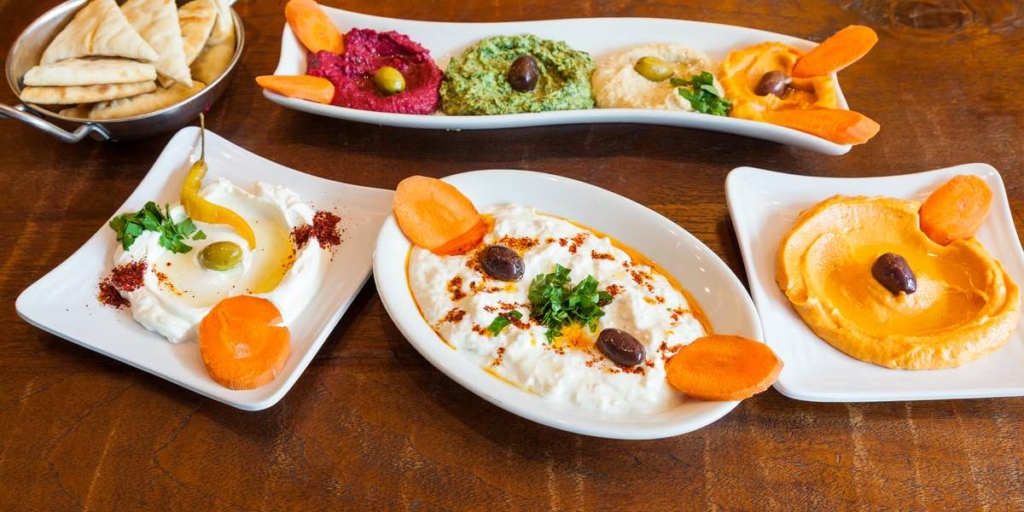
Rainbow Hummus Platter, Eggplant Dip and Kefir Cheese with Za’atar
What’s a challenge from your early days that makes you laugh now, looking back?
What happened is my husband said, “Let’s sell meat.” So he put meat in the menu, very tasty. I used the taste I remembered from my childhood. I’m not a cook. And one day we realized every single customer who comes to Cafe Turko smells like kebab, because there is no hood. And the next door was a dance studio, remember? And every single person who comes there to learn dance goes home with the smell of Cafe Turko. Because the ceiling was not completely covered. And then we spent probably $1,400 for a hood that health department would approve.
We didn’t have a dishwashing machine. I remember customers doing their dishes because there was no plate and not enough employees. And when Mother’s Day, Valentine’s Day came, we had so many reservations, but no tables and chairs. From Craigslist, we had a delivery right here. My husband bought the tables and the chairs when they were in the trunk. He didn’t check if they were stable enough. So all of them were wiggly.
I have so many, so many. I’m sure every single restaurant owner has memories to share, maybe one or two book’s worth.
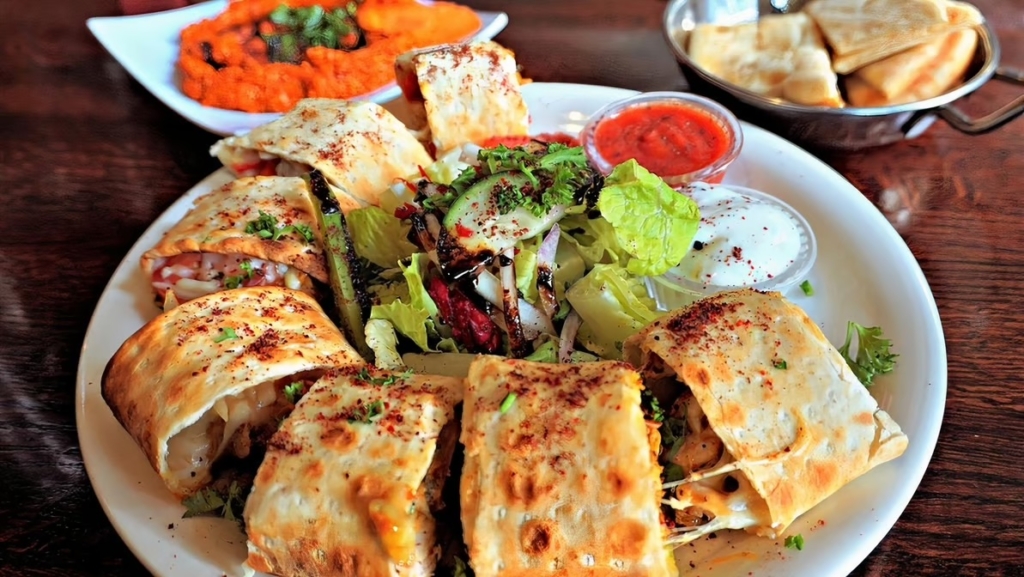
Beyti Kebab
You say that Cafe Turko is a success story. What does success mean to you?
We feel fortunate. We got the support from locals, support from Muslims, our own community. And also, we, me and Turkish people, my family, we settled with less. We never wanted more money. We wanted more success. Success is not always money. If you do something right, money will come. Our purpose was leaving happy customers behind us.
To me, I never look at the numbers. I look at how many people came. That’s the success. If these people can come here after 10 years, serving almost 80% the same menu, that’s a success. I am sure many people make way more than us, but that’s not my measurement. I measure success with attendance.
I’m happy in this way, too. You know, if you start with good intentions, every impossible becomes impossible.
What’s something about your business that customers might not know?
So, we have been in Fremont for 27 years. And always, even when we had the other business, we had a prayer room. We rented a small room in those days, $100 a month. A tiny office room that we used for praying purposes only. But now, so many people come here to pray only, not to eat.
Because they know that there is a place where you can wash up and pray available. So it’s very important for us. So even one day if I need to, if I have to sell this business, it would break my heart to think that the person who is going to buy my business may close the prayer room.
Because it serves the community. Taxi drivers, Pepsi drivers, people who know we have it, they just come, say hi, they go pray and they leave. They don’t even order, which is okay for us. And we made this prayer room from our restroom space. So we have to walk a long way to go to the restroom because we made our restroom space a prayer room.
Which is okay. I mean, I don’t regret it. Priorities, right? Whatever makes you happy in life, you should go for it.This is my new decision in life. You shouldn’t care about money, you shouldn’t care about what it’s going to bring your life. Whatever makes you happy, just go for it. You may not have a chance, second chance. And life may be too short.
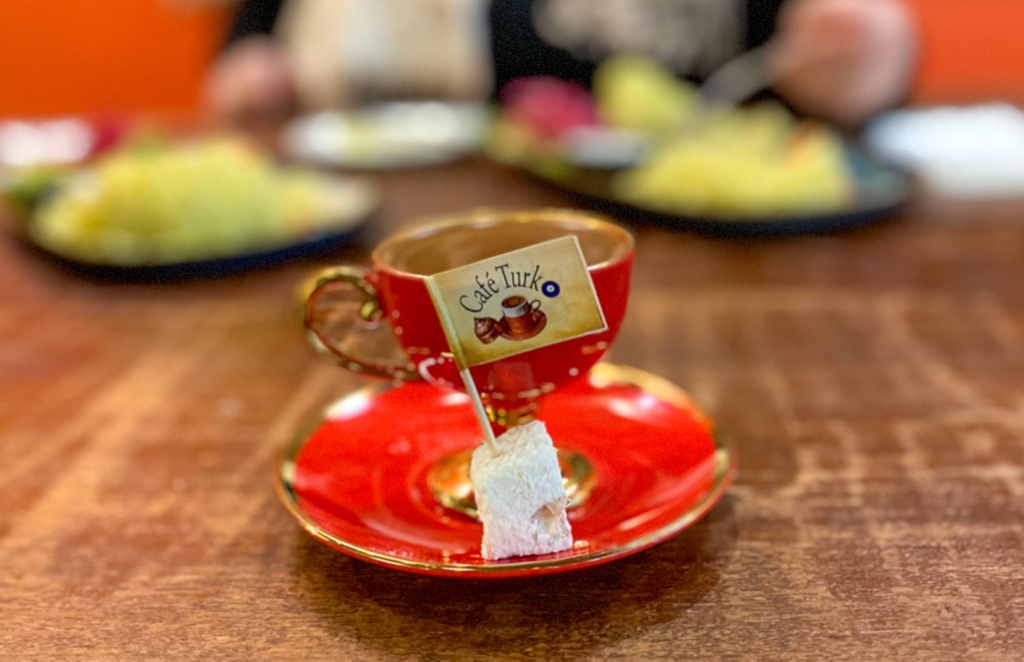
Turkish Coffee with a piece of Turkish Delight.
Can you talk to us about your menu, and your new menu items?
When I opened this restaurant, we didn’t have stove, we didn’t have this, we didn’t have that, and also staff problems and space problems. So I am smart. I used my strategic teaching at PCC for 7 years for the menu here. I would spend 10-15 minutes of my cooking time over there at PCC to ask people, “why do you come to my class? What do you think about Turkish cooking? What brings you to cooking classes in general?” So I learned that some certain ingredients attract attention and some certain techniques attract attention.
And definitely people want to know if it’s vegan, if it’s gluten-free, if it’s dairy-free. It makes them feel comfortable. So I put this in practice way before anybody else around us put the ingredients and the qualifications in their menu, I already had them. Because I knew it was very important. And people feel happy and comfortable if they see.
We didn’t have many Turkish employees before. But after what’s been going on in Turkey lately, Turkish population is increasing very fast because of refugees. And all of a sudden there were a lot of Turkish cooks coming to United States, and some of them we hired. So all of a sudden we had people who know Turkish cuisine other than just me, and we added several extra kebabs in the menu. And we have brunch back now (on weekends).
And what new dishes? I don’t like to offer what everybody offers, what is available at other places. So, for example, I came up with falafel omelette. Who has falafel omelette? Nobody. And (we added) some Turkish pastries. There was a guy who was making bread, and we always bought his bread. And I would always tell him, come work with us. He never wanted to come work with us.
One day, he said he wants to come work with us. Now he works in the kitchen as the bread guy.
Things happen slowly. One day one comes. Other day other goes. But what happens is steadiness. It’s going steady.
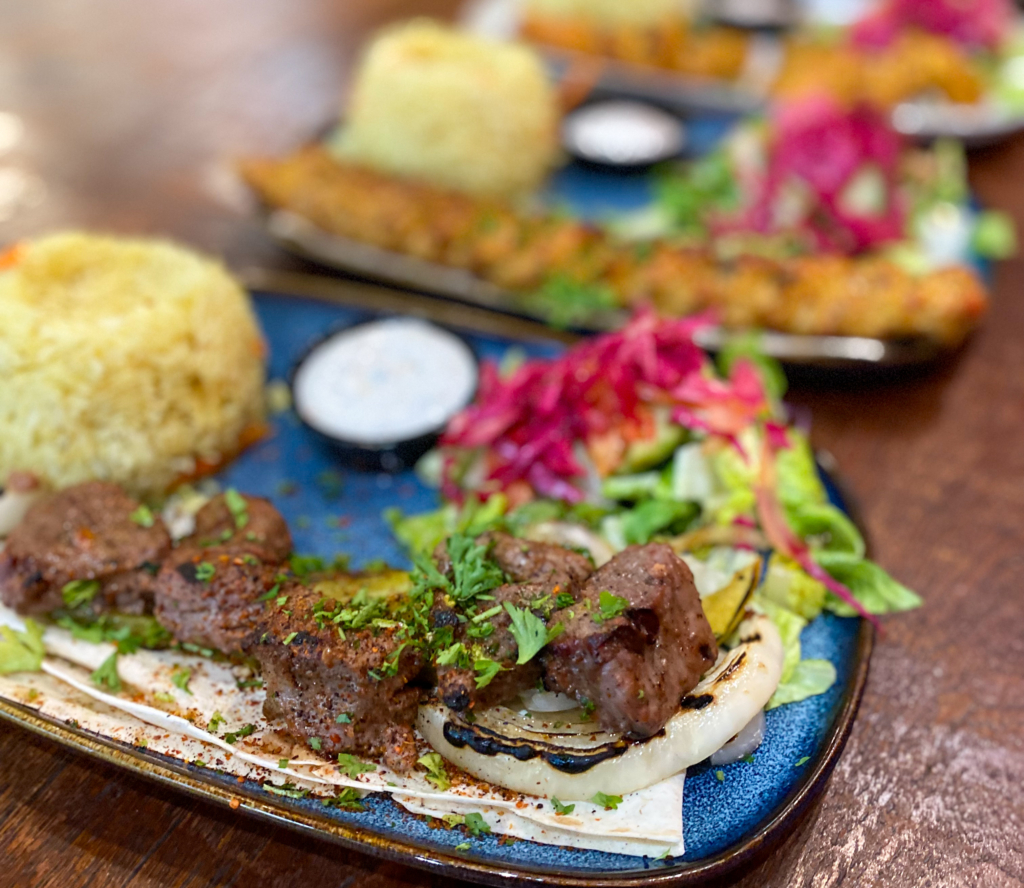
New Kebab Plates including lamb and chicken
What are the dishes that remind you of your childhood?
The first one is Ali Nazik. Every time I eat it. I’m not kidding. Every time I take a bite I say, “Oh my God, Oh my God.”(Growing up) we had a tiny table for six people. My family was five people: two brothers and dad and mom of course. That dish takes me to that table.
And we had a relative. She used to make this dish, and she would tell me, “Süreyya, make this. It’s not fried, it has very little oil, and no animal products. It’s very healthy, and it’s very tasty.” I can remember her face every time I put all the ingredients together, or somebody compliments that it’s such a healthy dish.
For the breakfast items, there is one dish called Mother-in-law Breakfast Plate. My mother-in-law is 84. I named this dish after her, because that’s what she would eat every single morning. Eggs, jam, olives, two kinds of feta cheese, one hard-boiled egg, and one slice of bread and butter. We named it after her.
And then after my husband’s passing, we added a dish that was his favorite, because he loved dipping his bread in tomato sauce, and eating with the meat. It makes you feel good.
We personalize the dishes with our memories, so hopefully they will be remembered in a better way.
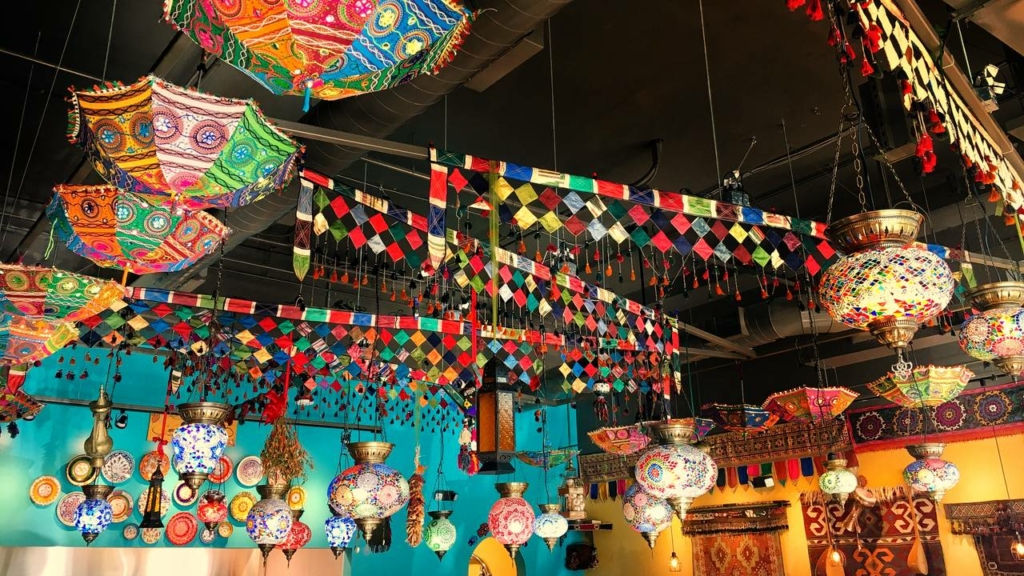
The lights and decor inside Cafe Turko. Photo Credit: OpenTable
What do you hope people learn about Turkish culture after they visit here?
First of all, this looks like a very traditional restaurant in Turkey, with the lights, decor, and colors. This turquoise is the color of Turkish sea.
The second thing is, I like used. I like old tables, I like old textiles. Because this is disappearing, in this time of the world. Everybody sits in front of computers. They don’t buy rugs anymore. Nobody is weaving anymore. Nobody is making desserts, or crochet or needlework or knitting. Those things are over. People don’t invite each other to their house. We want to open the doors to people, and when they come here, they feel like they are in a Turkish house. Because I can’t invite all these people to my house, right? I used to try.
Thirdly, of course, the taste. Everything served here is how I like, and how I remember it as a child.
You do so much for the community behind the scenes. Can you tell us a little bit about that?
The money I make here? I don’t spend it on myself anymore. We do a lot of charity work. A lot. First of all, I never turned down anybody. If somebody comes to me and needs something, I will be there for them. And I’m going to extend my arms to other countries. Right now, we have a lot of children we are taking care of in Gaza. And we have connections with India, We several schools in Egypt, and definitely in Turkey. We have been helping people out since the earthquake a few years ago.
Here (in Seattle) people did not need cash help before, or as much before. But right now, my God. So many people have a hard time paying rent, paying electricity bill, paying this, paying that. I never would think that I would need to help out our community this much before. But right now, people come with demands. So I tell my children, this business has to go well, and it has to continue, if we want to continue helping out the community. It makes you feel good. It makes you feel so good to offer food to people. “Hey, take this and don’t worry about it.”This is such a wonderful feeling.
I think when you come to a certain age, you don’t want to buy anything for yourself anymore. I will be 60 very soon. I don’t need anything in my house. I am ready to give, but not take anymore. And how are you going to satisfy your personal satisfaction, personal needs? With helping out, of course. Because that’s how you feed yourself. And not with gold, not with diamond, not with clothing, not with cars. I mean, come on. I don’t need good cars. I don’t need anything expensive.
What I need is a happy soul. And I have it right now.

1 response to “Business Spotlight: Cafe Turko”